Experts welcome announcement that Moderna vaccine works on coronavirus variants, but concerns remain
Boston Globe – January 25, 2021

Experts on Monday welcomed Moderna’s announcement that the company’s vaccine would protect people against variants of the virus that recently emerged in Britain and South Africa.
But they also noted that the company’s news came with a caveat: The vaccine appears to be less effective against the South Africa variant, so the company is studying whether a booster shot, in addition to the current two-shot regimen, will provide more protection.
“On the plus side, the research suggests that the vaccines still would be effective against even the South Africa variant. Of some concern is that the neutralization isn’t quite as strong” for the South Africa variant, Dr. Paul Sax, clinical director of the Division of Infectious Diseases at Brigham and Women’s Hospital, said in an e-mail.
Dr. Howard Koh, a professor at the Harvard T.H. Chan School of Public Health and a former assistant secretary of health and human services in the Obama administration, noted that the study released by Moderna was small and the results had not been peer-reviewed, but said it added to “the urgency for additional clinical trials regarding best ways to protect people, including booster shots.”
“Other variants will inevitably be described,” Koh, who is also a former Massachusetts public health commissioner, said in an e-mail. “Everyone needs to be on high alert during this highly dynamic time in the pandemic.”
Stephen Hoge, president of Cambridge-based Moderna, said, “The virus is changing its stripes, and we will change to make sure we can beat the virus where it’s going.” The company’s chief executive, Stephane Bancel, said the company was acting out of an “abundance of caution.”
The study Moderna announced Monday has not been peer-reviewed yet, but it has been posted to bioRxiv, which publishes preliminary studies online.
Angela Rasmussen, a virologist affiliated with Georgetown University, was among the experts who hailed the announcement on social media. She said in a tweet that it was “great news. The Moderna vaccine elicits antibody responses that neutralize the emerging variants. The vaccines still work.”
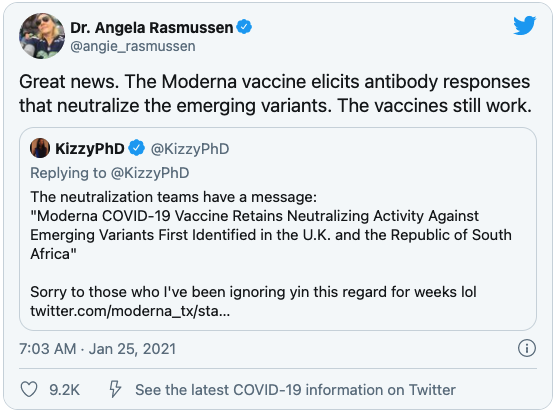
“This is good. Moderna vaccine also retains neutralizing activity against emerging variants,” said Akiko Iwasaki, an immunologist at Yale University.
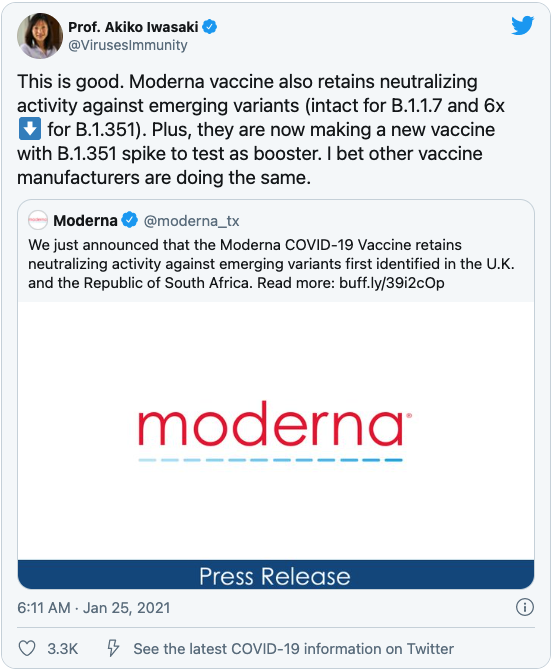
“This is really good news! Get your #Covidvaccine when you are eligible,” said Dr. Carlos del Rio, an infectious disease expert at Emory University.
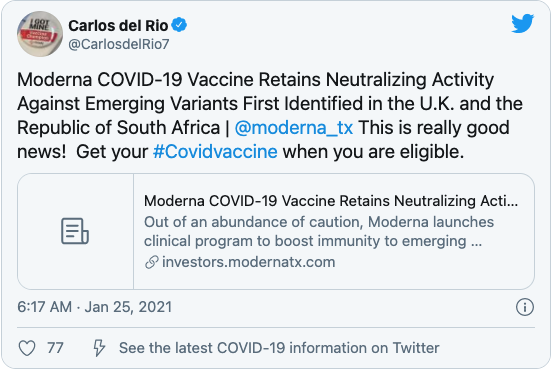
“Translation: this is really good news,” said Dr. Isaac Bogoch, an infectious disease expert with the University of Toronto.
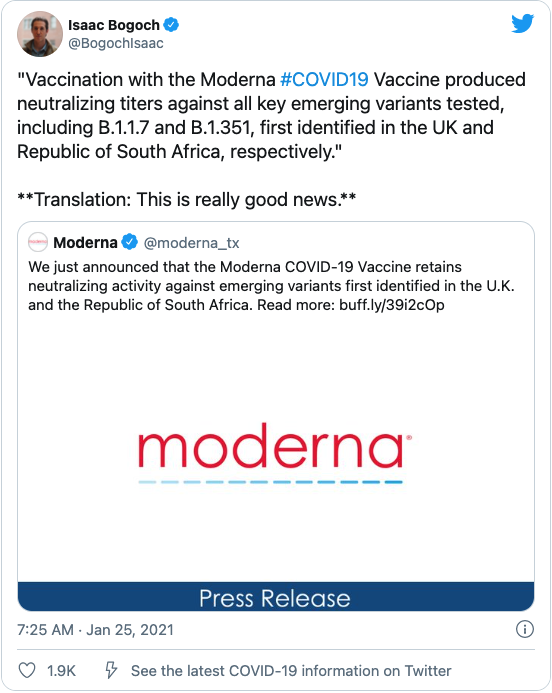
Dr. Krutika Kuppalli, an infectious disease specialist at the Medical University of South Carolina, called it “great news and important information.”
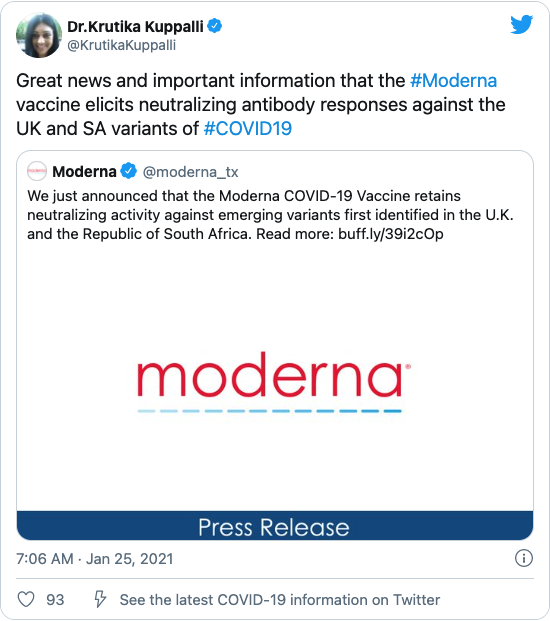
One prominent Boston virologist was more cautious in his assessment of the announcement from Moderna.
Dr. Dan Barouch, who runs the Center for Virology and Vaccine Research at Beth Israel Deaconess Medical Center and helped design a one-shot COVID-19 vaccine for the health care giant Johnson & Johnson, said it’s premature to read too much into Moderna’s study one way or the other. Moderna said it tested how blood samples taken from only eight volunteers in an early-stage trial reacted in the lab to the South African variant and another strain detected in the United Kingdom.
Barouch said scientists are uncertain what level of antibodies are necessary to make someone immune to the coronavirus.
Barouch also noted that a third shot would complicate the campaign to vaccinate people. “If a third shot is needed, it will make the vaccine rollout more difficult,” he said.
Dr. Peter Hotez, dean of the National School of Tropical Medicine at Baylor College of Medicine and an authority on vaccines, said he wouldn’t be alarmed if a coronavirus vaccine ended up requiring three shots instead of two. Other vaccines have required a three-shot regimen, he said, including those for human papillomavirus, the most common sexually transmitted infection; hepatitis B; and the combination vaccine for diphtheria, tetanus, and whooping cough. Of course, those vaccines weren’t developed during a pandemic.
Hotez’s bigger concern, he said, is that he feels the federal government should be sharing findings about the vaccines that it has helped bankroll with billions of dollars, not the companies that made them.
“I don’t like hearing my information from company press releases because there’s an inherent bias,” he said. “When it comes to issuing press releases, they’re not doing it for public health concerns. They’re doing it for shareholders. I thought that would be corrected by the Biden administration. So far, it hasn’t been.”
The report from Moderna comes after Pfizer-BioNTech unveiled research last week that suggested its vaccine was effective at blocking the British variant. Prizer did not address the South African variant or another variant that has emerged in Brazil.
Laboratories across the world have been scrambling to study whether vaccines and treatments, particularly monoclonal antibodies, are likely to be effective against the new variants.
The virus has killed over 419,000 Americans and caused more than 25 million confirmed infections in the United States. And health experts have warned that the British variant will probably become the dominant source of infection in the United States by March. It has been reported in over 20 states, including Massachusetts. The South African variant has not been detected in the United States yet.
Dr. Anthony Fauci, President Biden’s chief medical adviser on COVID-19, said on NBC’s “Today” show, scientists werealready preparing to upgrade vaccines to address the mutated versions that erupted in Britain and South Africa.
Fauci said there is “a very slight, modest diminution” of the effectiveness of COVID-19 vaccines against those variants, but “there’s enough cushion with the vaccines that we have that we still consider them to be effective” against both.
Material from Globe wire services was used in this report.

